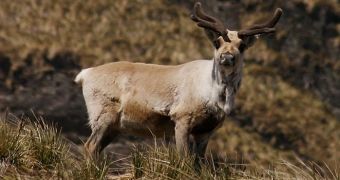According to the conclusions of a new study by researchers at Laval University, in Quebec City, it would seem that caribou populations around the world will not be able to endure future instances of climate change. This hypothesis was derived after experts looked at the species' genomic signatures.
Around 20,000 years ago or so, advancing ice sheets covered important parts of North America, during a time called the Last Glacial Maximum. At the time, this event caused caribou populations in Alaska and Canada, on one hand, and Siberia, on the other, to become separated.
As a result, Eurasian and American caribou were unable to mingle for a few thousand years. This eventually led to the formation of distinct species, which are nowadays no longer able to produce viable offspring. Interestingly, this separation had effects on the genetic make-ups of North American caribou.
These changes, investigators say, are very likely to make these species of caribou unable to adapt to further instances of climate change. Details of the research appear in a paper published in the December 15 issue of the top scientific journal Nature Climate Change.
“Although the past is not a guarantee for the future, it makes me pessimistic about the future of the species,” says the lead author of the study, Laval population geneticist Glenn Yannic. He explains that caribou populations are in decline worldwide, Nature reports.
“We’ve already been through a lot of climate change. The genetics will give us information on what happened at the ice-age interface, so why wouldn’t you use it to then make projections?” adds Trent University conservation geneticist, Paul Wilson.
One of the main reasons why global warming is affecting the safety and survival of caribou is that temperature variations are putting these herbivores out of sync with spring plant growth, which now occurs at different intervals then when caribous give birth. This increases the incidence of starvation within this population.
For this investigation, researchers analyzed DNA marker data collected from North American 1,297 caribou. The team found that these populations are made up of two, genetically-distinct lineages, which appear to have diverged around 300,000 years ago.
One of the lineages is found in Quebec, Newfoundland and the Canadian Prairies, while the second one covers ranges in Greenland, Russia, Alaska, the Canadian Arctic, and western North America.
“It’s heartening to know that they are predicting some stability in the Eurasian population. If the caribou have lots of diversity in these neutral markers, they will probably have a lot of diversity in those genes that allow them to adapt to environmental change,” comments University of Alberta paleogeneticist Tara Fulton.

 14 DAY TRIAL //
14 DAY TRIAL //